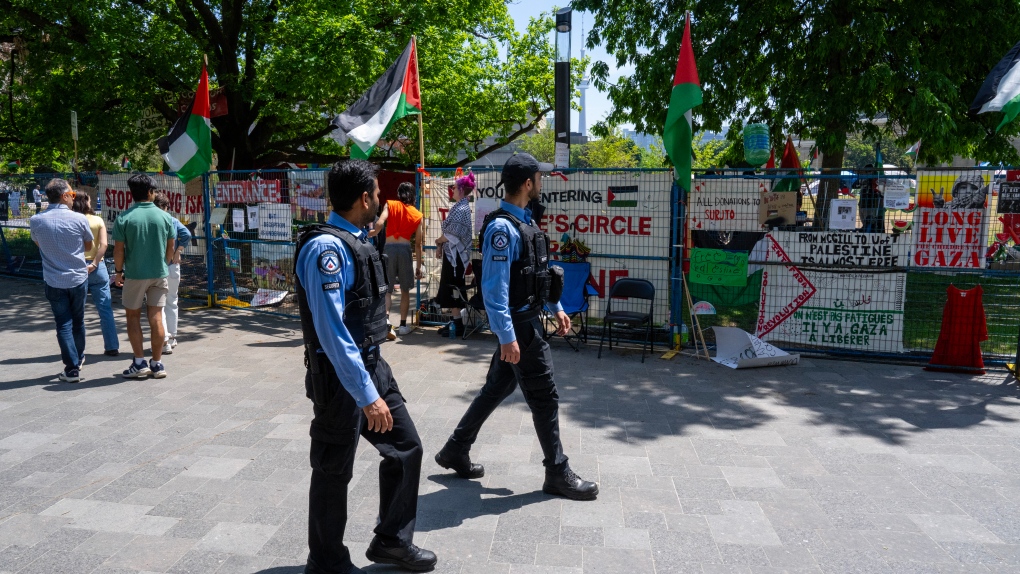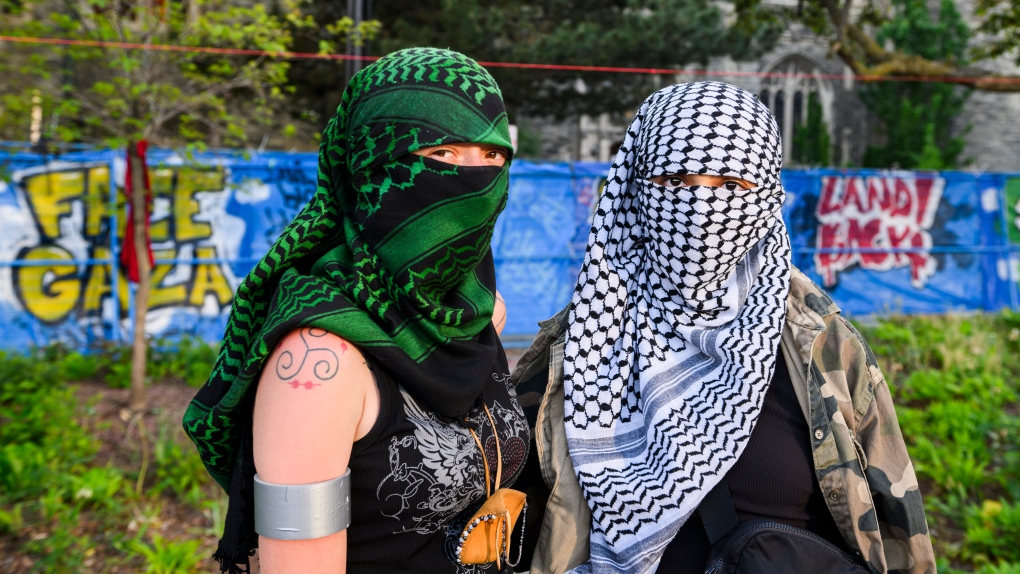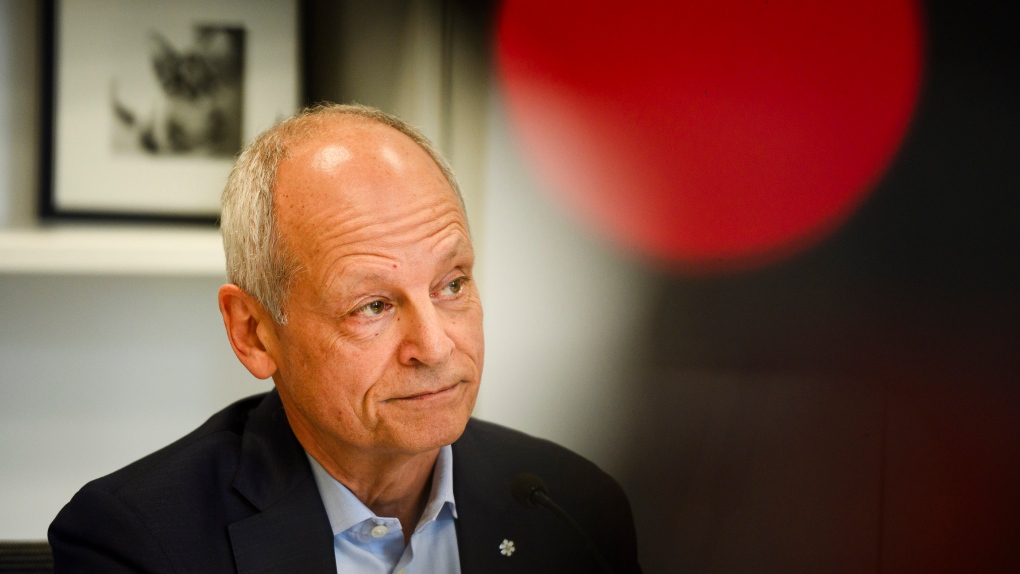'Just fly a drone over': Suggestion on encampment response at U of T Council meeting sparks privacy concerns for protesters, advocates
A suggestion by a University of Toronto Governing Council member to deploy drones and facial recognition on encampment participants and seek financial reparations from "bad actors" within the movement has sparked concern among protesters and privacy advocates.
The meeting, held on June 27, allowed council members to discuss the administration’s response to the action as it awaited a decision from the courts on the injunction that eventually brought an end to the encampment. In the days leading up to the forum, protest organizers had called on council members to urge the university to publicly disclose and divest from any investments with ties to the Israeli military.
Though the live stream of the forum is no longer publicly available and the university has yet to upload the minutes, CTV News Toronto has reviewed a recording of the meeting, during which members did not discuss pathways to fulfilling the outlined demands with the administration.
Instead, a number of council members called upon the university to employ enforcement measures or disband the encampment altogether, citing concerns of antisemitic rhetoric stemming from the encampment.
“It's my belief that you really can't have healing unless you also have justice,” alumni member Brian Madden told the council as part of a suggestion that the university seek financial reparations from participants that had broken the school's code of conduct.
“I understand that it's difficult and challenging to identify those in the encampment,” Madden continued. “But I will say, I find it implausible that with the technology we have at hand today – facial recognition, artificial intelligence, machine learning – that we couldn't really just fly a drone over there and in some fashion, identify those who are in [and] out, at least some of them.”
"Not all 300 of them are bad actors, but if we don't hold to account the ones who are, then, by implication, all of them will be thought to be so."
When reached for comment, Madden did not respond to acknowledge requests for further comment.
In a statement to CTV News Toronto, the university said it does not use any form of facial recognition technology, artificial intelligence or drone technology for surveillance. It added that, during council meetings, members have the opportunity to engage in open discussions with senior administration and during those conversations, “suggestions and ideas can arise that may diverge from [its] established policies and practices.”
It also reiterated a commitment made to students on the day they cleared the campus that the administration would not pursue any legal action against the known participants of the encampment, or in relation to other pro-Palestinian protests on campus.
Still, in the wake of the action, the response of the university and the assertions of its governing council have sparked lingering concerns among those who participated in the months-long demonstration.
“It’s extremely troubling,” said organizer Sara Rasikh, referencing the suggestions of surveillance.
“We’ve already seen Toronto police deploy these kinds of technologies [...] and now what we're seeing is the Governing Council calling for those same surveillance technologies to be expanded onto university campuses," Rasikh said.
 Security guards patrol outside the fence surrounding the pro-Palestinian encampment set up at the University of Toronto campus, in Toronto, Sunday, May 26, 2024. THE CANADIAN PRESS/Frank Gunn
Security guards patrol outside the fence surrounding the pro-Palestinian encampment set up at the University of Toronto campus, in Toronto, Sunday, May 26, 2024. THE CANADIAN PRESS/Frank Gunn
The use of surveillance and/or punitive measures in the context of protests and wider law enforcement is of concern to the Canadian Civil Liberties Association, according to Anaïs Bussières McNicoll, director of the Fundamental Freedoms Program and acting director of the Privacy Program.
“We have the right in Canada to go out and about in anonymity without fear of mass surveillance by the state,” Bussières McNicoll told CTV News Toronto in an interview. “The minute we accept a proposition that the state or other actors can surveil who is attending what legal activity, I think we're giving up on a very important, fundamental right – privacy rights.”
The use of facial recognition technology also runs the risk of misidentification, she added.
“When you're thinking about the use of FRT (Facial Recognition Technology) in the context of law enforcement, you're thinking about the risk of wrongfully charging innocent people for a crime they have not committed, which, to us, is extremely profoundly problematic,” Bussières McNicoll said.
And, whether employed or not, the lawyer added that just the suggestion of such measures serves to chill freedom of expression.
“Because people who would have liked to engage in that protest, but who fear their engagement in a perfectly legal protest might be monitored and surveilled by the state or by other actors, could choose not to go,” she said.
Those involved in the encampment have already faced forms of retribution for their involvement, including threats made to participants by members of the public and warnings of police retribution put forth by campus security, according to Rasikh. Suggestions of surveillance and retribution from the council could serve to escalate such actions, she said.
“There’s a reason people mask at these protests – not because they don’t believe what they’re standing up for, but because of the doxing,” she said. “We've had people getting harassed on the streets since we left the encampment because they can be linked to it.”
 Protestors pose for a portrait inside a pro-Palestinian encampment set up at the University of Toronto campus, in Toronto on Friday, May 24, 2024. THE CANADIAN PRESS/Christopher Katsarov
Protestors pose for a portrait inside a pro-Palestinian encampment set up at the University of Toronto campus, in Toronto on Friday, May 24, 2024. THE CANADIAN PRESS/Christopher Katsarov
While council members cited a need to protect the university's student body and staff against anti-Jewish sentiments within their suggestions of enforcement, the decision later handed down by Superior Court Justice Markus Koehnen found no evidence that antisemitic rhetoric had come from within the encampment or its participants. Over the course of the protest, one person was arrested and charged with assault, but neither police nor the university clarified the accused's involvement, if any, with the movement.
According to Rasikh, efforts to paint the protest as violent or hateful are often rooted in anti-Palestinian sentiment.
"It's an age-old trope that the Imperial world continues to fall back to reduce the cause of these students as being in bad faith or not being legitimate," she explained. "Painting us as hateful and or violent, for example, [...] often gives people a justifiable reason to agitate or express hate."
In his final message regarding the action, U of T President Meric Gertler acknowledged a "deep" division amongst the university community.
"Members have shared a wide range of views with me and the administration since the encampment began. Some of our colleagues and students have been left feeling frustrated or unwelcome." Gertler said. "In the months ahead, we will work to address these harms and find healing in the longer term."
 University of Toronto President Meric Gertler speaks to media during an announcement at UofT in Toronto, on Thursday, May 23, 2024. THE CANADIAN PRESS/Christopher Katsarov
University of Toronto President Meric Gertler speaks to media during an announcement at UofT in Toronto, on Thursday, May 23, 2024. THE CANADIAN PRESS/Christopher Katsarov
To do so, says Rasikh, will require not only a desire for reconciliation on the administration's part but a rethinking of its response leading up to this point.
“The university can hold on to whatever belief system they have, but they cannot take our tuition money and allow it to be invested into weapons manufacturing companies that are killing the family and friends of their own students," she said. "We will continue showing up until our demands are met."
The university's fall semester begins on Sept. 3.
With files from CTV News Toronto's Jon Woodward.
Correction
Editor's Note: In a statement to CTV News Toronto, a U of T spokeperson asserted that students’ tuition is not included in the portion of the university’s funds invested by external third-party managers and is not invested into company securities. Only its Endowment Fund, composed of donations, is managed by external parties and can be invested as such.
While the university has maintained that any claims connecting it to the Israeli military action have no basis in fact, the spokesperson declined to disclose whether its third-party managers had invested any portion of the Endowment Fund in companies with ties to the Israeli military, stating they were not authorized to divulge such information.
CTVNews.ca Top Stories

Canada expands list of banned firearms to include hundreds of new models and variants
The Canadian government is expanding its list of banned firearms, adding hundreds of additional makes, models and their variants, effective immediately.
The latest: Water bottle, protein bar wrapper may help identify shooter in UnitedHealthcare CEO's killing
The masked gunman who stalked and killed UnitedHealthcare CEO Brian Thompson used ammunition emblazoned with the words 'deny,' 'defend' and 'depose,' a law enforcement official said Thursday. Here's the latest.
Man wanted for military desertion turns himself in at Canada-U.S. border
A man wanted for deserting the U.S. military 16 years ago was arrested at the border in Buffalo, N.Y. earlier this week.
7.0 earthquake off Northern California prompts brief tsunami warning
A 7.0 magnitude earthquake shook a large area of Northern California on Thursday, knocking items off grocery store shelves, sending children scrambling under desks and prompting a brief tsunami warning for 5.3 million people along the U.S. West Coast.
The world has been warming faster than expected. Scientists now think they know why
Last year was the hottest on record, oceans boiled, glaciers melted at alarming rates, and it left scientists scrambling to understand exactly why.
Saskatoon based dog rescue operator ordered to pay $27K for defamatory Facebook posts
A Saskatoon based dog rescue operator has been ordered to pay over $27,000 in damages to five women after a judge ruled she defamed them in several Facebook posts.
Pete Davidson, Jason Sudeikis and other former 'SNL' cast members reveal how little they got paid
Live from New York, it's revelations about paydays on 'Saturday Night Live.'
Canadian life expectancy up, but still below 2012 levels
The average Canadian can expect to live 81.7 years, according to new death data from Statistics Canada. That’s higher than the previous year, but still lower than pre-pandemic levels.
These foods will be hit hardest by inflation in 2025, according to AI modelling
The new year won’t bring a resolution to rising food costs, according to a new report that predicts prices to rise as much as five per cent in 2025.
































